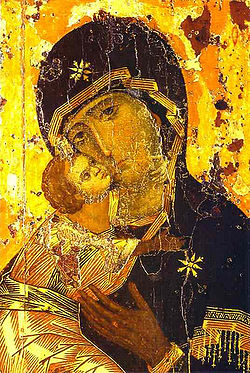|
|||
|---|---|---|---|
| This weekly bulletin insert complements the curriculum published by the Department of Christian Education of the Orthodox Church in America. This and many other Christian Education resources are available at http://dce.oca.org. | |||

The Vladimir Icon of the Mother of God is sometimes referred to as "Tenderness" because of the loving, intimate way it portrays Christ and His Mother. In Matthew 12: 38-45 we read about some scribes and Pharisees who say to Jesus, "Teacher, we wish to see a sign from you." Their attitude is apparent in the way they address Him, because their way is different from that of the disciples, and of many who believe in Him. When the disciples become desperately afraid in the storm-tossed boat on the sea, they awaken Him by saying, "Save, Lord, we are perishing" (8: 25). When He heals two blind men who are following and crying after Him, they answer His question, "Do you believe that I am able to do this?" by saying, "Yes, Lord" (9: 28). But the scribes and Pharisees only call Him "Teacher" and not "Lord." In so doing they make it clear that they do not accept Him as the Messiah. All they want is to challenge and possibly disparage Him, rather than learning or becoming followers. Jesus is well aware of their motivation. He has already shown them many signs and wonders; it is insulting and ridiculous for them to ask for one now, as if He still has to prove Himself to them. So He calls them an evil and adulterous generation. The word "adulterous" refers to Israel's unfaithfulness in disobeying and rejecting God. He adds that the only sign they will receive is the sign of Jonah, and tells them that just as Jonah was in the belly of the whale for three days and three nights, the Son of Man will be "in the heart of the earth" for three days and three nights. (Jesus' comparison of the Jonah story to His death and burial is the basis for our reading of the Book of Jonah on Holy Saturday. Jonah's story is one of the Old Testament prophecies of His overcoming of death through the Resurrection.) Next, Jesus compares the scribes and Pharisees unfavorably to people who are not learned Jews as they are. The inhabitants of Ninevah repented at Jonah's preaching, He reminds them, and "something greater than Jonah is here." When the queen of the South (the Queen of Sheba, described in I Kings 10: 1-13) heard about the wisdom of Solomon, she "came from the ends of the earth" to hear Solomon's words, and "something greater than Solomon is here." Those people understood, yet the scribes and Pharisees who know the Scripture refuse to understand that the One who fulfills it is standing before them. But the sign is given. The Resurrection will happen, and it begins with the Incarnation that the Vladimir Icon of the Mother of God so beautifully shows us. The Theotokos understands, as the Ninevites and the Queen of Sheba before her did. She knows very well that "something greater than" Jonah or Solomon, or anyone else, is here. |
|||
